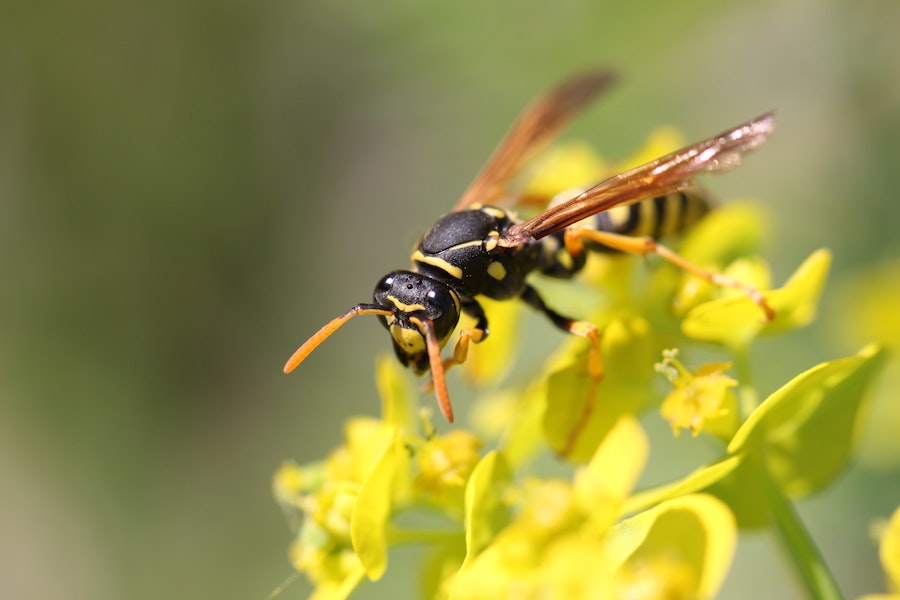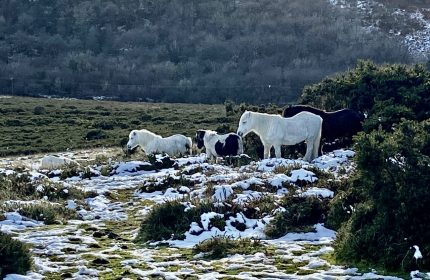Wasps: A total nuisance or horticultural hero?
The warm summer has led to a rise in wasp numbers, according to pest controllers, while the heat has caused fruit – the wasp’s favourite sugary meal – to ripen much faster than usual.
We are all painfully aware of how much of a nuisance these yellow and black critters are when we’re trying to have a civilised summer barbecue, as we attempt to swat them away and send drinks and food flying in the process.
But don’t diss the wasp too much because:
Wasps are good for the garden

Wasps are good pollinators
Wasps are hugely beneficial to the garden, says RHS principal entomologist Dr Andrew Salisbury. “The social wasps are hugely important beneficial predators – the grubs in the nest need to be fed a protein diet and that is other insects. Caterpillars are a favourite.
“I have watched them remove every single cabbage white caterpillar from a patch of nasturtiums, and we have had reports of them feeding on box tree moth caterpillars. They come in, sting the caterpillar, remove the head and fly off with the body to feed the grubs.”
They are eco-friendly
Not only do wasps play a vital ecological role in that they control the numbers of potential pests like greenfly and many caterpillars, they are also valuable pollinators.
Traps can make things worse

Home-made wasp traps aren’t necessarily the solution
There are so many traps on the market which capture wasps, but they can make things worse, says Salisbury – the signals they give off when trapped can attract even more waps to the same site.
“Like most insects, wasps rely heavily on volatile chemicals (odour). They are individually able to detect (‘smell’) food, without necessarily needing to communicate with each other to indicate where it is.
“Visual cues are also likely to be used, as is contact chemotaxis (tasting). Wasps will also release volatile chemicals (pheromones) which can signal to others.”
Swatting won’t help
“Wasps can release alarm pheromones when they think they are being attacked, so flapping about or swatting will cause this. It will induce defensive behaviour and makes them likely to sting.”
There are good wasps and bad wasps

A native hornet, Vespa crabro, on its nest
There are seven species of social wasps common to the UK, some of which make their nests underground or in dark cavities such as roof spaces, others which make their nests in open air situations such as the branches of a tree or shrub.
You may be alarmed by the size of the hornet (Vespa crabro), Britain’s largest social wasp, yet it is much less aggressive than other species of wasp. It is a useful garden predator and will predate on other species of wasp. It nests in rot holes in trees and other dark cavities.

The Asian hornet, a non-native species, can wipe out bees
The Asian hornet (Vespa velutina), however, is an invasive non-native species which arrived in France in 2004 where it spread rapidly. According to the Great British Non-Native Species (nonnativespecies.org/home/index.cfm), affiliated with Defra, it’s a highly effective predator of insects, including honey bees and other beneficial species, and can cause significant losses to bee colonies.
It has only one yellow stripe on its abdomen whereas the native hornet has several yellow stripes. Although sightings are rare and have so far been confined to Devon, Somerset, Gloucestershire and Lancashire, anyone who believes they have found a nest should not go near it and report it to the Non-Native Species Secretariat at [email protected].
Non-chemical control

Protect your vines from wasps
If wasps are damaging your fruit, reduce the risk by enclosing some of the fruit trusses in bags made from muslin or nylon tights.
Fix wasp-proof screen over greenhouse doors to protect grapes and if you’re going down the trap route, half fill a jam jar with water and jam, put a sheet of paper over the top of the jar, secured with an elastic band and punch a hole in it with a pencil to allow the wasps to enter – but not escape.
The RHS notes: “A wide variety of wasp traps are also available from garden centres and hardware stores, although it is not clear if these traps reduce wasp numbers locally or attract more wasps from further afield.”
Wasp watch
#BigWaspSurvey – How it works. > Register > Wait till August 25th > Make Your Trap (#recycle an old bottle) > Put it out for 7 days > Post your Wasps to us for Free and > Submit your trap online#WaspLove #CitizenScience #Wasps pic.twitter.com/AHd6v7ZzPu
— Big Wasp Survey (@bigwaspsurvey) August 5, 2018
Help scientists find out more about wasp species, diversity and distribution by taking part in the Big Wasp Survey between August 25 and September 8. For details go to bigwaspsurvey.org.
And if the worst comes to the worst, eat your barbecued food indoors.
The Press Association
Latest posts by The Press Association (see all)
- Maple Cinnamon Granola - January 8, 2025
- 8 things your feet can tell you about your health - January 8, 2025
- 9 ways to look after your emotional health better in 2025 - January 7, 2025
- EastEnders fans to vote on storyline for the first time in 40th anniversary week - January 7, 2025
- Aldi beats rival Lidl as cheapest supermarket of 2024 - January 6, 2025





















